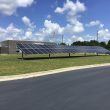Global challenges
While green purchasing practices are increasing around the world, there are common challenges reported by purchasers that need to be overcome to facilitate further progress. The most frequently cited challenges include:
Sporadic implementation. Government purchasers around the world report that green purchasing activities are easier for some product categories than for others. They also report varying levels of political support, which affects their ability and willingness to integrate human health, environmental and social considerations into the purchasing process. In developing countries, understandably, green purchasing priorities are subordinate to other more pressing priorities such as ensuring access to suitable housing, clean water and energy.
Poor reporting. Procurement systems are typically designed to track expenditures; they are not historically designed to track progress against environmental and social goals. Large contracts covering multiple product categories such as construction or office supply contracts include multiple opportunities to include greener products, but the individual value of those purchases is rarely (if ever) quantified. As a result, it is challenging to know how effective green purchasing programs are or what metrics should be used to track progress.
Pricing concerns. Some purchasers continue to believe that greener products cost more than competing products. While numerous studies demonstrate that greener products can save money in some cases, the perception that greener products and services will cost more prevents some purchasers from seeking or considering greener options.
Performance concerns. Although performance requirements can be defined in contracts, some purchasers worry that greener products will not perform as well as traditional products. As a result, they fail to consider the benefits of greener products and services.
Complex tradeoffs. Purchasers around the world also report that it can be difficult to identify greener products because there are tradeoffs. An energy-efficient product, for example, might use more water or contain more hazardous materials than a competing product. Purchasers are not environmental experts and without clarity on which human health, environmental or social benefits should be prioritized, it can be difficult to build green requirements into the purchasing process.
Global solutions
Like the challenges reported by purchasers from around the world, the solutions to those challenges are remarkably familiar. Purchasers around the world are looking to ecolabels and purchasing networks to make green purchasing easier. They also recognize the value of international harmonization efforts to reduce confusion about how to identify and buy greener products and services.
Eco-labels. The most useful green purchasing tool cited by purchasers worldwide is eco-labelling. An environmental label, based on third-party certification to a respected environmental standard, makes it much easier to identify greener products and services. Many countries have developed their own environmental labels to recognize greener products. The United States government has developed a number of labels focusing on specific environmental claims – Energy Star for energy efficiency; Water Sense for water efficiency; BioPreferred for bio-based content. Other countries have developed single labels that address multiple environmental concerns. The Global Ecolabelling Network (GEN) is a network of 26 environmental labels that meet internationally accepted ISO Type 1 environmental label requirements. GEN has created mutual recognition agreements among some of its members to foster the emergence of global environmental standards. Other organizations, like UL Environment, are also focusing on the need for global standards.
Green Purchasing Networks. Japan launched the first Green Purchasing Network (GPN) in 1996 to share green purchasing practices, develop green purchasing tools, and identify greener products and services. Other GPNs have emerged throughout the world, including the Responsible Purchasing Network in the United States. The International Green Purchasing Network (IGPN) was founded in 2005 to facilitate communication among regional GPNs and the promotion of global best practices. Working closely with members of the global eco-labelling community, IGPN and individual GPNs are harmonizing efforts to define greener products and services and the purchasing practices that make their purchase possible.
United Nations Environment Programme (UNEP). The United Nations has also recognized the tremendous power of government procurement to address environmental challenges and has launched an effort to improve international collaboration. The Sustainable Public Procurement Initiative (SPPI) is a key component of the UNEP’s Sustainable Consumption and Production program. UNEP is focusing its activities on the tools necessary to scale green purchasing initiatives globally through access to better information and improved green purchasing tools.
Global challenges, local action
Global challenges, including global environmental challenges, require global solutions. Global solutions require local action. Government purchasers around the world are doing their part by buying greener products and services from greener companies. Local purchasing decisions made by purchasing professionals around the globe are creating the economic incentives for a greener, healthier, more sustainable world. Purchasers around the world are proving that it is possible to buy a greener future on a global scale.
Sources
— Dr. Anastasia O’Rourke, DEKRA; United Nations Environment Programme, Sustainable Public Procurement: A Global Review, December 2013
— International Green Purchasing Network, Government Green Procurement: Charting a Roadmap Towards a Greener Future, September 2013;
— Fourth International Conference on Green Purchasing (Kuala Lumpur, Malaysia), September 2013;
— International Symposium on Ethical Purchasing (Sapporo, Japan), February 2014.
_____________
To get connected and stay up-to-date with similar content from American City & County:
Like us on Facebook
Follow us on Twitter
Watch us on Youtube















